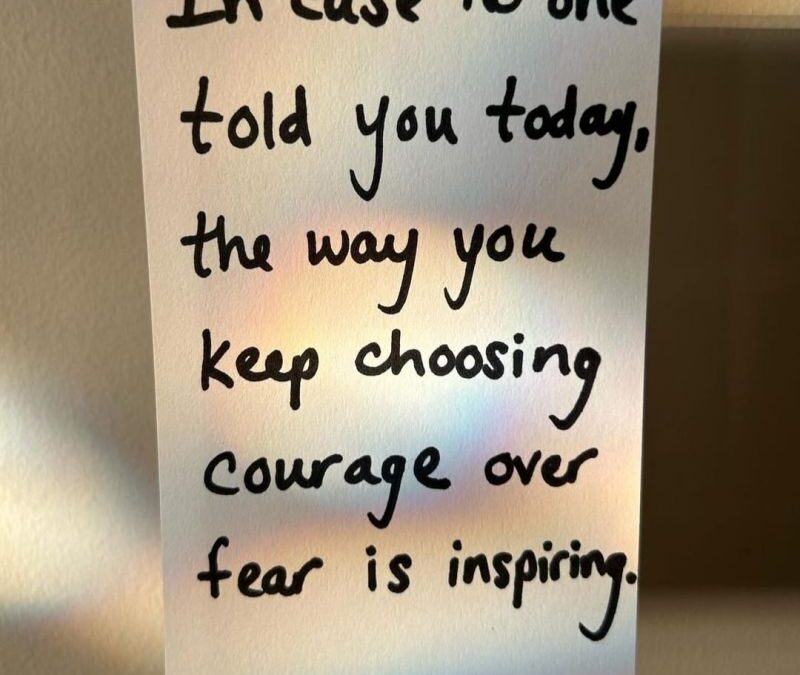Why are we afraid of change?
Auteur: Marie Donzel dans Eve Magazine-le 29 septembre 2023
Change holds out the promise of lots of exciting things: new things, improvements to what already exists, opportunities to learn, opportunities to produce value… We know it, we’re convinced of it and in principle we’re up for it… Yes, but when it comes to implementing change, we discover that we’re much more resistant than we imagined. But why then ?
We call this metathesiophobia
The scientific name for the (real) fear of change is metathesiophobia.
Let’s break it down:
- Meta, in Greek, is “that which goes beyond”, “that which exceeds” and by extension “that which changes”.
- Thesis means “that which is set”, “that which is in place”.
- Phobia is fear, aversion, dread and, by extension, rejection.
Uncertainty: the most demanding context for our cognitive system
Metathesiophobia thus relates to uncertainty about the evolution of our environment. It is this lack of understanding of the impact of a transformational movement on our environment and on our own condition that sends us into a panic. We would like to know so that we can anticipate our adaptations. This is a fundamental cognitive and psychosocial need: we lose our means when we are faced with the risk of our behaviour becoming obsolete.
To adapt, you need experience
It’s important to remember that we are constantly developing skills that enable us to react when we are faced with situations that we have already experienced or that are similar to what we have already experienced. For example, I’ve already experienced rainy days, I’ve experienced that rain gets wet and that if I can’t dry off, I’m likely to feel cold, which will be uncomfortable and possibly conducive to falling ill. So if it’s raining outside, or if I know it’s likely to rain, I plan to go out when there’s a break in the weather, and I make sure I have waterproof clothing. These situational intelligence skills help us to relieve stress and, when faced with an uncomfortable situation, enable us to re-establish our sense of security and control as best we can.
When anxiety puts us in a position of inefficiency
But if the downpour comes on suddenly, without the meteorologists having foreseen it, without there having been any warning signs of the change in weather, or if these signs have appeared too suddenly, then we are faced with anxiety: is this manifestation of climate disruption in the image of other, far more catastrophic changes? What will become of us if the weather is no longer reliable? Where are we going if there are no more seasons? And by the way, are we sure it’s really rain?
In short, not having the time or the means to adapt plunges us into abysses of anxiety. Our emotions compete with our reasoning, instead of enriching it: we confuse the signal, the understanding of the situation and the solution to respond to it. That’s what it means to lose your nerve.
Reasoning out fear of change: what a bad idea!
The bazaar of the soul backstage at the theatre of reason
But after all, it’s only a shower and you’re not made of sugar! At work, it’s just a new process and you’re not unfit to adapt. Are your offices moving? It’s just a change of location and a different route to get there, and you’re not a sedentary die-hard. What’s more, if you think about it, new things can be good for you. Vous re-stimuler. Encourage you to learn. What’s more, the area around your new premises is really nice. What’s more, the layout is conducive to cooperation. And, in the end, it won’t add to your journey time. And then, and then, and then… You acquiesce to everything you’re told about the benefits of change, keep your worries to yourself, and even plunge headlong into the exciting adventure of a new beginning. But behind the scenes in your soul, it’s a bit of a mess.
Why finding the reasons for fear doesn’t alleviate it
Rationality is even less effective at countering the fear of change than any other fear. Every time you put good reasons for not being afraid in front of a fear, you increase your feelings of guilt and damage your self-esteem. You find yourself full of personal faults that will fuel the feeling that you are incapable, out of date and perhaps too old to take your full place in society. To say that you are confronted with the fear of death, the mother of all other fears, is an understatement.
Why finding the reasons for fear doesn’t alleviate it
What’s annoying is that anxiety undermines everything you need to cope with change: your sense of confidence, but also your ability to cope with change via the negative impact of excess cortisol on the hippocampus, the prefrontal cortex and the amygdala, your sense of direction, your ability to memorise and mobilise knowledge, your situational intelligence, your organisational skills, your ability to prioritise, your vision of the medium and long term, your creativity and your mental resources for finding solutions all deteriorate. Not to mention the influence of your emotional state on relationships: change is a formidable catalyst for conflict and other painful, if not downright painful, emotional breakdowns.
Coping with anxiety, welcoming underlying needs
Consider the fear of change as a manifestation of vertigo
Change is inherently frightening. It refers irreducibly to what has been and is no longer, requiring a process of mourning.. It also refers to imbalance, producing sensations of vertigo. We should remember that vertigo is a state of dizziness close to (and sometimes leading to) malaise, in the face of which the priority for both the body and the psyche is to regain stability.
What would you do when faced with someone suffering from vertigo? You would probably put her in a safe place, provide her with a supportive arm, help her to take the necessary step back from the cause of her condition (look at the horizon if she is unwell in transport, move away from the edge of the cliff if she is afraid of heights, etc.), reassure her and, if possible, give her time to recover before continuing with any activity whatsoever (car journey, mountain hike, etc.).
When faced with the fear of change, we need to adopt the same postures and practices: take a sympathetic view of the state of anxiety and treat it as a priority issue.
Responding to the needs revealed by change
Putting up with anxiety (in others as in yourself) means taking it seriously. Only then will we be able to hear the underlying, unmet needs that prevent people from projecting themselves into what change means to them. But what are these underlying needs embedded in the fear of change? These may include :
- Frustrations and dissatisfactions prior to the transformation period. We don’t see them any more because the individuals have compensated in order to find their stability, but they fear that the equilibrium they have thus cobbled together will be upset by a change in their environment. For example: two people don’t get on and the conflict has never been managed. They compensated by avoiding crossing paths and working together. But now a new way of organising work means that they have to keep each other informed about what they’re doing. Here, the underlying need is to manage the conflict that has been swept under the carpet, so that any change is not a source of anxiety and obligations to over-adapt.
- Need to be considered as a subject. Imagine you’re a teenager and your parents decide to move to a town 500 km away from where you live and have built up your whole social life. You’ll need to understand why the move is necessary. You also need to know how it’s going to work. You’ll probably need to see the house where you’ll be living, the school where you’ll be studying, find out more about the living conditions you’ll be living in… And no doubt you’ll need to be given real and serious undertakings guaranteeing that, yes, you’ll be able to continue to see your “old” friends, that your parents will do everything they can to allow you to return to your home town for holidays, etc. In short, it is essential for the individual not to be subjected to change as a fact to which he or she must adapt, but to be fully considered as a subject in his or her own right, whose support is sought and whose adaptability therefore depends on a feeling of security.
- Guaranteed decision latency. Most changes leave many of us with an impression of arbitrariness: that’s the way it is, that’s life, there’s no choice. Your company is bought out and your whole working environment is turned upside down (new organisation, new management methods, new processes, new people…). If it were up to you, you’d move on. Yes, but you have no choice, you have to earn a living and you have to accept the new rules of the game to do so. Your motivation is likely to be damaged by this feeling of inevitability. The meaning you find in your work may soon evaporate. Every time a change makes us say “we have no choice anyway”, it’s because we experience the change as a deprivation of decision-making time and freedom. So we need to be sure that the freedom given up here is compensated for by new authorisations there. In other words, there can be no change without individuals being able to negotiate the change: negotiate the conditions, the benefits, the procedures, the pace, etc.
The points of view expressed by the authors of videos, academic or non-academic articles, blogs, academic books or essays (“the material”) are those of their author(s); they in no way bind the members of the Global Wo.Men Hub, who, amongst themselves, do not necessarily think the same thing. By sponsoring the publication of this material, Global Wo.Men Hub believes that it contributes to useful debates in society. The material could therefore be published in response to others.







Commentaires récents